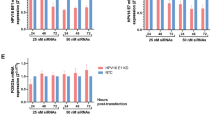Abstract
The p16 (MTS1) tumour-suppressor gene is a cyclin-dependent kinase (cdk) inhibitor that decelerates the cell cycle by inactivating the cdks that phosphorylate the retinoblastoma tumour-suppressor gene (Rb) protein (pRb). In cervical cancers, pRb is inactivated by the HPV E7 oncoprotein or by mutations. The hypothesis of earlier reports was that the disruption of the p16/cdk-cyclin/Rb cascade is essential for malignant cervical transformation/carcinogenesis. We previously established in vitro model systems of cervical cancer representing four steps of oncogenic progression initiated by the two most common oncogenic HPVs in ectocervical and endocervical epithelial cells. This report used these systems to investigate the role of p16 in cervical cancers. A dramatic enhancement of the p16 RNA level was observed after immortalization by HPV 16 or 18. Furthermore, the p16 protein was newly observed following immortalization. However, no further changes were found for RNA or protein levels after serum selection or malignant transformation. For three cervical carcinoma cell lines, similar high levels of p16 expression were seen. Point mutations or homozygous deletions of p16 were not observed in the in vitro systems or in clinical specimens. These results suggest that the inactivation of the p16/cdk-cyclin/Rb cascade does not occur during malignant transformation but occurs during the immortalization by HPV in HPV-harbouring premalignant lesions, the in situ equivalent of immortalized cells. Also suggested is that p16 has no role in the specific malignant transformation step from immortal premalignant lesions during the carcinogenesis of HPV-initiated cervical cancers.
This is a preview of subscription content, access via your institution
Access options
Subscribe to this journal
Receive 24 print issues and online access
$259.00 per year
only $10.79 per issue
Buy this article
- Purchase on Springer Link
- Instant access to full article PDF
Prices may be subject to local taxes which are calculated during checkout
Similar content being viewed by others
Author information
Authors and Affiliations
Rights and permissions
About this article
Cite this article
Nakao, Y., Yang, X., Yokoyama, M. et al. Induction of p16 during immortalization by HPV 16 and 18 and not during malignant transformation. Br J Cancer 75, 1410–1416 (1997). https://doi.org/10.1038/bjc.1997.243
Issue Date:
DOI: https://doi.org/10.1038/bjc.1997.243
This article is cited by
-
Salivary DNA methylation panel to diagnose HPV-positive and HPV-negative head and neck cancers
BMC Cancer (2016)
-
Detection of human papillomavirus DNA in peri-tumor tissues and pelvic lymph nodes as potential molecular marker of micrometastasis in cervical cancer
Infectious Agents and Cancer (2016)
-
Forging a signature of in vivo senescence
Nature Reviews Cancer (2015)
-
Expression of p16 protein and epidermal growth factor receptor in patients with adenocarcinoma of the uterine cervix: an immunohistochemical analysis
Archives of Gynecology and Obstetrics (2011)
-
p16INK4A overexpression and HPV infection in uterine cervix adenocarcinoma
Virchows Archiv (2006)



